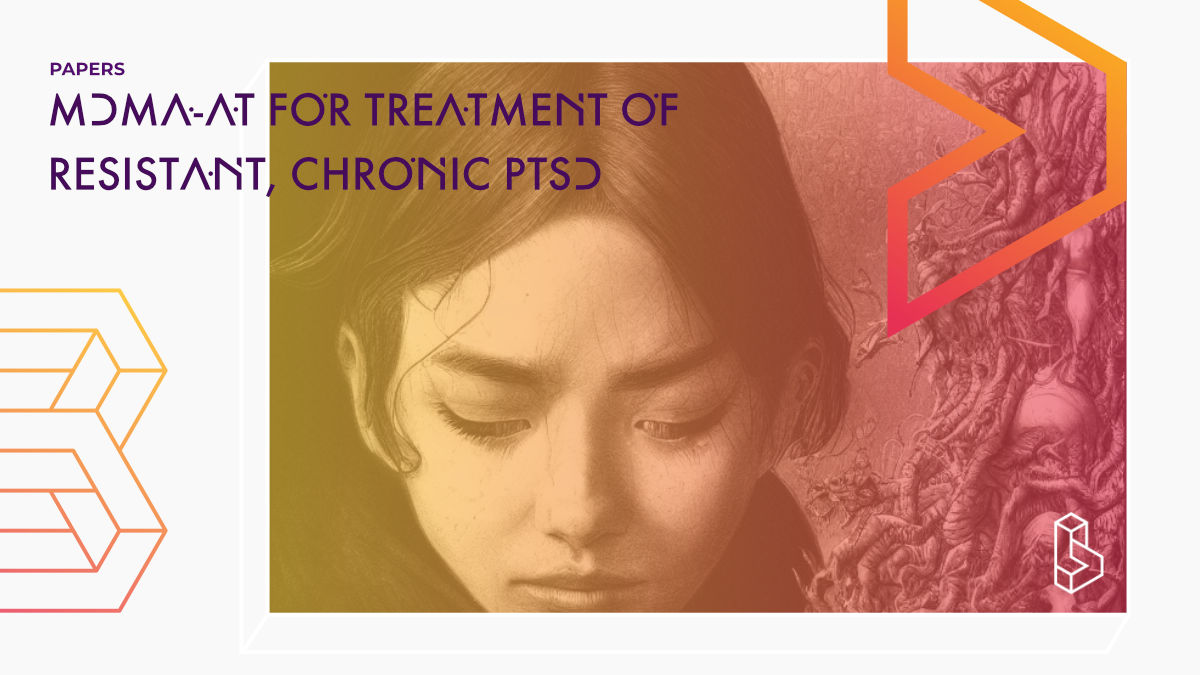Three doses of MDMA (125mg) showed the most promise in this pilot study (n=12) of MDMA psychotherapy for PTSD. The CAPS score (PTSD measure) was just shy of significance, self-reported improvement was significant.
Abstract of A randomized, controlled pilot study of MDMA (±3,4-Methylenedioxymethamphetamine)- assisted psychotherapy for treatment of resistant, chronic Post-Traumatic Stress Disorder (PTSD)
“Psychiatrists and psychotherapists in the US (1970s to 1985) and Switzerland (1988–1993) used MDMA legally as a prescription drug, to enhance the effectiveness of psychotherapy. Early reports suggest that it is useful in treating trauma-related disorders. Recently, the first completed pilot study of MDMA-assisted psychotherapy for PTSD yielded encouraging results. Designed to test the safety and efficacy of MDMA-assisted psychotherapy in patients with treatment-resistant PTSD; our randomized, double-blind, active-placebo controlled trial enrolled 12 patients for treatment with either low-dose (25 mg, plus 12.5 mg supplemental dose) or full-dose MDMA (125 mg, plus 62.5 mg supplemental dose). MDMA was administered during three experimental sessions, interspersed with weekly non-drug-based psychotherapy sessions. Outcome measures used were the Clinician-Administered PTSD Scale (CAPS) and the Posttraumatic Diagnostic Scale (PDS). Patients were assessed at baseline, three weeks after the second and third MDMA session (end of treatment), and at the 2-month and 1-year follow-ups. We found that MDMA-assisted psychotherapy can be safely administered in a clinical setting. No drug-related serious adverse events occurred. We did not see statistically significant reductions in CAPS scores (p = 0.066), although there was clinically and statistically significant self-reported (PDS) improvement (p = 0.014). CAPS scores improved further at the 1-year follow-up. In addition, three MDMA sessions were more effective than two (p = 0.016).”
Authors: Peter Oehen, Rafael Traber, Verena Widmer & Ulrich Schnyder
Notes on A randomized, controlled pilot study of MDMA (±3,4-Methylenedioxymethamphetamine)- assisted psychotherapy for treatment of resistant, chronic Post-Traumatic Stress Disorder (PTSD)
This study was one of the first to apply the double-blind placebo-controlled study design to MDMA-assisted therapy for PTSD. It is published (2012) shortly after Mithoefer et al. (2010) and served as a confirmation of the previous results (which it partly did, but no significance on the CAPS score) and test with another therapy team. Different in this study was the use of an active placebo (12.5mg MDMA) vs an inactive placebo.
In conclusion the authors recommend limiting the number of follow-up sessions, but expanding the introductory sessions from two to three (to strengthen the therapeutic alliance).
This study was supported by MAPS.
Summary of A randomized, controlled pilot study of MDMA (±3,4-Methylenedioxymethamphetamine)- assisted psychotherapy for treatment of resistant, chronic Post-Traumatic Stress Disorder (PTSD)
Post-traumatic stress disorder is a common problem in everyday medical practice and a major and costly public health problem all over the world. Psychotherapy has been recognized as the most effective form of treatment for PTSD, but studies of Cognitive Behavior Therapy show high drop-out rates and limited effect on PTSD symptoms. Despite better understanding and growing efficacy of existing psychotherapies for PTSD, the only FDA-approved drugs for this indication, sertraline and paroxetine, show only modest effects on PTSD symptoms. MDMA-assisted psychotherapy is a novel approach to the treatment of PTSD.
Psychiatrists and psychotherapists used MDMA legally as a prescription drug, to enhance the effectiveness of psychotherapy, in the US and Switzerland. A pilot study found that MDMA-assisted psychotherapy was safe and effective for treating treatment-resistant PTSD.
MDMA, a substituted phenylethylamine, was first synthesized in 1912 by the pharmaceutical company Merck, and was later introduced to psychotherapy by the psychotherapist L Zeff. MDMA-assisted psychotherapy shows promising results in the treatment of chronic PTSD.
Find this paper
https://doi.org/10.1177/0269881112464827
Open Access | Google Scholar | Backup | 🕊
Cite this paper (APA)
Oehen, P., Traber, R., Widmer, V., & Schnyder, U. (2013). A randomized, controlled pilot study of MDMA (±3, 4-Methylenedioxymethamphetamine)-assisted psychotherapy for treatment of resistant, chronic Post-Traumatic Stress Disorder (PTSD). Journal of psychopharmacology, 27(1), 40-52.
Institutes
Institutes associated with this publication
MAPSMAPS stands for Multidisciplinary Association for Psychedelic Studies, it's the front runner in making psychedelics a legal way to use (and improve) in therapy.
Compound Details
The psychedelics given at which dose and how many times
MDMA 125 mg | 3xLinked Clinical Trial
Study of 3,4-Methylenedioxymethamphetamine-assisted Psychotherapy in People With Posttraumatic Stress DisorderThis randomised, double-blind, placebo-controlled Phase 2 trial (n=14) investigated MDMA-assisted psychotherapy for treatment-resistant PTSD, comparing a full dose (125 mg + optional 62.5 mg booster) versus an active placebo dose (25 mg + optional 12.5 mg booster) administered during three 8-hour therapy sessions.

